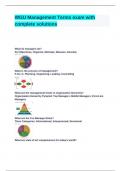WGU Management Terms exam with
complete solutions
What do managers do?
Set Objectives, Organize, Motivate, Measure, Develop
What is the process of management?
P.O.L.C. Planning, Organizing, Leading, Controlling
What are the management levels in organization hierarchy?
Organization Hierarchy Pyramid: Top Managers, Middle Managers, First-Line
Managers
What are the Ten Manager Roles?
Three Categories: Informational, Interpersonal, Decisional
What are state of art competencies for today's world?
,Enabler, Leading Teams, Conversation/Collaboration, Dispersed/Empowering,
Mobilizing for Change
Management Perspectives Over Time
Management Perspectives Over Time
Political forces
Relate to the influence of political and legal institutions on people and
organizations. The increased role of government in business is one example of a
political force.
Economic forces
Affect the availability, production, and distribution of a society's resources.
Classical Perspective
The classical perspective (Takes a rational, scientific approach to management
and seeks to turn organizations into efficient operating machines.) .The classical
perspective on management emerged during the nineteenth and early twentieth
centuries. The factory system that began to appear in the 1800s posed challenges
that earlier organizations had not encountered. Problems arose in tooling the
plants, organizing managerial structure, training employees (many of them non-
English-speaking immigrants), scheduling complex manufacturing operations,
and dealing with increased labor dissatisfaction and resulting strikes. Frederick
Winslow Taylor (1856-1915). Taylor's theory that labor productivity could be
improved by scientifically determined management practices earned him the title
of "father of scientific management."
Scientific Management
Scientific management (A subfield of the classical perspective that emphasizes
scientifically determined changes in management practices as the solution to
improving labor productivity.) emphasizes scientifically determined jobs and
management practices as the way to improve efficiency and labor productivity. In
the late 1800s, a young engineer, Frederick Winslow Taylor (1856-1915), proposed
that workers "could be retooled like machines, their physical and mental gears
recalibrated for better productivity." Taylor insisted that improving productivity
meant that management itself would have to change and, further, that the manner
, of change could be determined only by scientific study; hence, the label scientific
management emerged. Taylor suggested that decisions based on rules of thumb
and tradition be replaced with precise procedures developed after careful study
of individual situations. A Harvard Business Review article discussing
innovations that shaped modern management puts scientific management at the
top of its list of 12 influential innovations.
Bureaucratic Organizations
Systematic approach developed in Europe that looked at the organization as a
whole is the bureaucratic organizations approach (Emphasizes management on
an impersonal, rational basis through elements such as clearly defined authority
and responsibility, formal
recordkeeping, and separation of management and ownership.) , a subfield within
the classical perspective. Max Weber (1864-1920), a German theorist, introduced
most of the "Students would be more likely to have a positive impact on the
future of management if they were more engaged with the history and traditions
of management— particularly that of a German concepts on bureaucratic
organizations.
Humanistic Perspective
The humanistic perspective (Emphasizes understanding human behavior, needs,
and attitudes in the workplace.) on management emphasized the importance of
understanding human behaviors, needs, and attitudes in the workplace, as well
as social interactions and group processes. There are three primary subfields
based on the humanistic perspective: the human relations movement, the human
resources perspective, and the behavioral sciences approach.
Human Relations Movement
The human relations movement (Stresses the satisfaction of employees' basic
needs as the key to increased productivity.) was based on the idea that truly
effective control comes from within the individual worker rather than from strict,
authoritarian control. This school of thought recognized and directly responded
to social pressures for enlightened treatment of employees. The early work on
industrial psychology and personnel selection received little attention because of
the prominence of scientific management. Then a series of studies at a Chicago
electric company, which came to be known as the Hawthorne studies (A series of
research efforts that was important in shaping ideas concerning how managers
should treat workers.) , changed all that.
Human Resources Perspective




